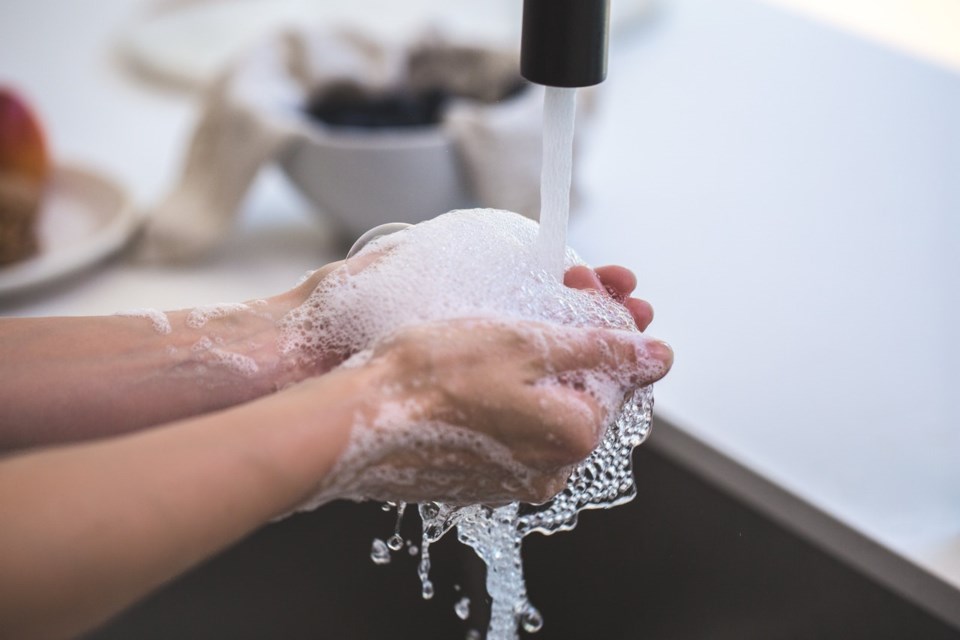I stand at my bathroom sink and take a deep breath. My shoulders relax — just a little bit. I turn on the water to hot, uncomfortably so, probably. We have an ‘on-demand’ water heater downstairs and it will take a while for the warm water to wind its way through the system and get to the faucet in front of me. I notice that the soap dispenser is low. So right now the ritual of washing my hands has an added step. I open the dispenser and fill it with the soap that will let me do what I need to do.
I fill my hands with soap. I’ve resisted the urge, so far, of taking off of my rings, my watch, my bracelet, of pulling up my sleeves past my elbows, and scrubbing all the way up to my forearms.
It’s been so long since our son was in the pediatric intensive care unit. He was so small, so vulnerable, and I remember the nurses there admiring my scrub up technique. To enter the PICU, we had to go to the wash station and wash our hands. There were instructional cards there that I looked at as I washed my hands. I remember feeling helpless then too, anxious, and afraid. And so often, when I felt that way, ritual, whether useful or even helpful, helped my brain keep the panic at bay. I scrubbed my hands, my fingers, my palms, my arms back then, as if by doing that I could somehow protect him, as if that would help him heal, help him accept his bone graft, help him breathe. Washing my hands became a moment of peace.
We eventually came home with wound care to tend to and the strict handwashing needed to continue. His safety was dependent on my diligence. And somehow, I think in my mind, everyone’s safety was dependent on my handwashing. My peace became dependent on my handwashing. So, the ritual of handwashing stayed. That momentary peace, that minute of control I got at the sink, stuck. And it was hard to let go of. It took therapy. It took years. And it took intent. It. Was. Hard. But I did it. Yay me.
And now here we are. And here I am pretty much engulfed in panic and anxiety all the time. I find myself feeling completely out of control in an environment where we’re told that washing our hands is our best defense. I think you can see where I’m going.
Back at the sink. The water is running. The soap is in my hands and first I spread it on my palms, then I scrub each of my thumbs, then my fingers. I make sure I go back to my thumbs, my palms and the back of my hands. I don’t need to sing a song once or twice. I know I’m scrubbing long enough. I make sure I scrub my nails. In between my fingers. My thumbs again. I think about taking off my rings, my watch, my bracelet. I really want to. But I don’t. I haven’t yet. While I’m washing my hands my brain is quiet and I like that. I finally think I should probably stop. I rinse. Then rinse again. Check for soap. Give another rinse. Go to a towel and wonder if I should change it yet. Dry off each finger. I think I need to stop doing this so often. But that moment of quiet — I need it.
And I figure, out of all the maladaptive coping strategies I’ve had throughout my life, this one, at least might keep my family safer. I wonder what will happen when it’s not so necessary? Will I be able to stop again?
Before the video call starts with your colleagues, your friends, your family, there’s no knowing what was happening on the other side of the screen to prepare to virtually face the world. These are difficult times, and what the little bits of mental flotsam that return as a result can quickly become overwhelming. I can’t say this enough — now is the time to give everyone, including ourselves, as much compassion as we can muster.
Editor’s note: This piece was originally published on “Modeling Change,” Jordan’s blog.
Find it at modelingchange.blogspot.com/.
Isabel Jordan is a long-time Squamish resident who is a founding volunteer with the Rare Disease Foundation and works as a patient partner in health care and health care research.



